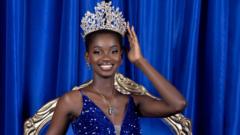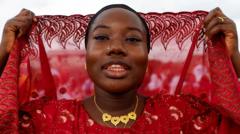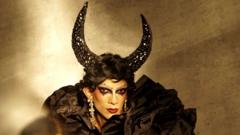The Miss Ivory Coast pageant has implemented groundbreaking changes, prohibiting wigs, weaves, and extensions, promoting a celebration of natural hair. Organizers aim to redefine beauty standards, encouraging contestants to showcase their authentic selves while sparking broader discussions on societal beauty perceptions.
A Natural Shift: Beauty Pageants Embrace Authenticity in Ivory Coast

A Natural Shift: Beauty Pageants Embrace Authenticity in Ivory Coast
New regulations in Miss Ivory Coast bring natural beauty to the forefront by banning wigs and weaves, challenging traditional beauty norms.
In a bold move, the Miss Ivory Coast beauty pageant is redefining standards of beauty by prohibiting wigs, weaves, and hair extensions in the preliminary stages. This change seeks to highlight natural beauty and occurs in a climate where traditional pageantry has leaned heavily on artificial enhancements. Marlène-Kany Kouassi, crowned Miss Ivory Coast in 2022, was a standout for sporting her natural hair, becoming one of only two winners in six decades to do so.
Victor Yapobi, the president of the organizing committee, expressed the intention behind the change: “We want the candidates to be natural—whether with braids or straightened hair, it should be their own. Beauty must be raw.” Ivory Coast's decision is distinct, being the only African nation with such a strict ban at a national competition. Besides the hair regulations, the pageant has also adjusted the height requirement, now allowing shorter contestants, raised the age limit to 28 years, and reduced the entry fee to lessen financial barriers.
During the preliminary rounds in Daloa, many contestants voiced support for the new rules, embracing the opportunity to showcase their true selves. Contestant Emmanuella Dali stated, “This rule gives me more pride as a woman— as an African woman.” The vibrant discourse isn't without dissent, particularly among those in the hair styling business. Hairdresser Ange Sea voiced concerns over the economic impact, noting that many women prefer wigs for various reasons, including creativity and maintenance convenience.
With the shift towards natural hair, former beauty queens often seen in wigs participated as spectators, highlighting the ingrained culture of wigs in West African beauty standards. Natural hair influencers and products have gained traction, albeit slowly, as many still consider natural hair unprofessional in conventional spaces like television.
As the competition continues, the question of whether beauty norms should be dictated by events like pageants or personal choices remains hotly debated. The reception to the new rules has been overwhelmingly positive, both locally and internationally, signaling a potential shift in perceptions of beauty. The final contestants of Miss Ivory Coast 2025, taking place in Abidjan, may still face a different hair policy; however, the organizers are open to continuing the natural beauty trend if it proves successful.
“We want to return to our roots,” Yapobi stated, emphasizing the importance of this transformation in the perception of beauty across Ivory Coast. For contestants like Doria Koré, who recently won the Miss Haut-Sassandra title, the significance of representing African beauty authentically is profound. As the pageant proceeds, many are walking away with a renewed sense of self-confidence, marking a pivotal moment for beauty pageants in Africa.















